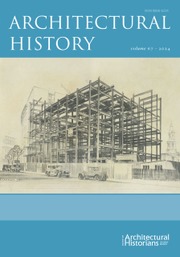No CrossRef data available.
Article contents
Norman Shaw’s letters: a selection
Published online by Cambridge University Press: 11 April 2016
Extract
Able architects can often be charming correspondents. This was frequently the case in late Victorian England, and since letters do much to prevent misconceptions and anachronisms creeping into the way that Victorian architecture is thought about and explain the living reality of the conditions under which architects then operated, their publication can be valuable. Since the last war John Brandon-Jones has published three such sets of letters, revealing particularly much of the personalities of Philip Webb and C. F. A. Voysey. This is an attempt to do for Norman Shaw what Mr Brandon-Jones has done for them. The following selection of twenty-three letters is chosen from a large set of transcriptions I have made in connection with a forthcoming biography of Shaw. I have included letters on a variety of subjects and from different periods of his life rather than a coherent group of letters on a single theme, and have tried to avoid more than the slightest overlap with letters to be quoted in the biography. The most significant omission is a pair of letters written to J. D. Sedding in 1882 in which Shaw bewails the state of architecture at length and criticizes his own performances. Throughout the selection I have emended Shaw’s jerky punctuation at will, to make the letters more readable. Two of them (Nos 1 & 10) are abbreviated, the first quite extensively.
- Type
- Research Article
- Information
- Copyright
- Copyright © Society of Architectural Historians of Great Britain 1975
References
Notes
1 ’Notes on the building of Smeaton Manor’, Architectural History, i (1958), pp. 31–58 Google Scholar; ‘Letters of Philip Webb and his Contemporaries’, Architectural History, viii (1965), pp. 52–72 Google Scholar; ‘Correspondence of C. Voysey’, The Architect C Building News, 3 June 1949, pp. 494–498.Google Scholar
2 ’Murray’ was the architectural traveller’s regular guide at this date, but was often in error. Shaw missed Vézelay because it was omitted in Murray.
3 This and the following two letters are in possession of Shaw’s grandchildren Mr Bryan Shaw and Miss Marjorie C. Shaw.
4 G. B. O’Neill, one of the Cranbrook painters.
5 James Temple was Shaw’s cousin, and client for Leyswood, though exactly what is meant by his ‘room’ is not clear.
6 Henry Holiday and Shaw were at this time designing the fine Brunei memorial window for Westminster Abbey, executed by Heaton Butler & Bayne.
7 This refers to Cheddleton church, just then being restored by Gilbert Scott with help from his son, the young George Gilbert Scott Jr, and the Morris firm. Shaw’s involvement came to nothing. His next letter says: ‘I think that coffin business at Cheddleton is a snare and a delusion altogether. She didn’t ought to have sent for me at all, as Scott is her man, and he ought to do what “under taking” - tap tap tap - there is to do.’
8 Blomfield, Reginald, Richard Norman Shaw R.A. (1940), p. 20.Google Scholar
9 Letter in Kew Archives, Gates Volume 1847-1913, p. 245.
10 Letter at Bingley parish church.
11 Letter at the V & A, MSS86 PP.7 misc.
12 Letter at the Convent of Bethany, Bournemouth.
13 This and the following letter are in the RIBA MSS Collection.
14 Wenham & Waters of Croydon was Shaw’s regular firm of plumbers.
15 Letter in possession of Mr Mark Norman at Moor Place.
16 This and the following two letters are in possession of Lord Inchiquin at Richards Castle.
17 Letter at St Margaret’s Vicarage, Ilkley.
18 These were the organ shutters at Thurstaston church, Cheshire, next to Dawpool.
19 Burne-Jones had just died.
20 Letter at the Royal Academy, F. A. White bequest.
21 Letter in possession of Mr Edward Holland-Martin at Overbury Court.
22 Shaw had to go to Antwerp for his part as English assessor in the first stage of an international competition for the University of California.
23 Letter at the Royal Academy.
24 This and the following letter are from the Liverpool Cathedral Archives deposited in Liverpool City Library, and are quoted by kind permission of the Liverpool Cathedral Building Committee.
25 Letter at the Fitzwilliam Museum, Cambridge.
26 What book is under discussion is unclear.
27 Letter at the Convent of Bethany, Bournemouth.
28 This and the following letter are from the Crown Estate Office files.


